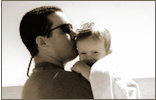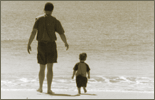April 23, 2007
On Wisdom
Caleb is learning to play chess. I realized this weekend that he often thinks three moves ahead. I will not lose to a seven-year-old. I played in a tournament once, and lost to a fourteen-year-old. That was humiliating enough. The first time I realized there are people smarter than me — people who simply have more horsepower in their brains — was in graduate school. My roommate, Jay, was a Harvard math major, and had perfect GRE scores. We would play chess, and he would ponder every possible permutation, and make no mistakes. I couldn't beat him. His brain worked that way with everything. I've met students and professors from numerous universities since my graduate school days, but I've never met anyone smarter than Jay.
Some people seem smart, because they've read and retained a great deal. That speaks more to an encyclopedic function in their brains, I think; they are like human filing cabinets. They can tell you in what book Herodotus describes the cold-hearted Xerxes as he surveys his men sailing to their destruction, they can even tell you what Xerxes is reported to have said, and how he wept at the grandeur of that sight. But they can't tell you what it means, the pathos and sentimentality and repugnance of it. They can only tell you when and where Xerxes met his defeat, and what scholars have written about what the Hellespont meant for Greek civilization and military power. They are parrots less than thinkers.
Jay was one of those people, however, who could not only retain information, but process it. He was an original thinker, armed with a sheer computing power that I realized I could never match. It is a humbling thing, to have pleasant illusions about oneself so decisively dispelled. I'm reminded of that humiliation as I play chess with Caleb, and see how quickly he absorbs the concepts, how in a short time he has already learned that he must control the center, and use his pieces in combinations. Toward the end of a game yesterday, as we sat head-to-head on lawn chairs in the late afternoon sun, after he had lost so many pieces that the end was beyond question, he made a sudden bold attack on my king with his bishop, supported by his knight.
This is how he will be, I think, smart and dangerous and surprising. It gives rise to a new fear, not that I will be shown less intelligent than I thought, but that I will fail to help him temper his intelligence with wisdom. Jay had wisdom about the ideas and concepts floating about the intellectual world in which we dwelled for a time, but he lacked wisdom about the deeper things, as I did, as did everyone I knew in graduate school, as do most of the people I know today whom the world considers intelligent and wise.
It turns out that horsepower alone isn't enough, that wisdom, and the discipline that flows in part from wisdom, are required. These are learned things, and my job is to help my sons learn them. That realization in itself is more humbling than living with a genius, or three little boys who show every sign of emerging smarter than me. It's humbling because I realize I'm simply not up to the task, if imparting wisdom means giving them what I possess.
What is the extent of my wisdom, thirty-nine years into a life in this world? That the heart of man is dark, that I know nearly nothing, and that I can't trust my instincts to do anything but betray me. My wisdom is in knowing how little wisdom I possess, and sadly, that in itself is more wisdom than what is held by most men I know, at least those outside my church.
But where can wisdom be found?
And where is the place of understanding?
Man does not know its value,
Nor is it found in the land of the living.
But that is where we look, isn't it, in the land of the living, meaning within ourselves and our lives, in the little things that we think we learn by accumulated experience, which likely as not serve instead only to confirm the delusions we have cherished from the beginning. If it's left to me to dredge up the wisdom my sons will need in order to be something more than intellectual processors, then I will fail.
Then He saw wisdom and declared it;
He prepared it, indeed, He searched it out.
And to man He said,
'Behold, the fear of the Lord, that is wisdom,
and to depart from evil is understanding.'
This is why we pray for our children, those of us with enough wisdom to realize how little wisdom we possess. This is why we read the second chapter of the book of Proverbs and speak it to our sons and daughters, pray it into their skins if we have to, because we know that what they need is beyond our power to give them. This is why parents, if they are more than simply humans who have procreated, are humbled creatures, because only in humbly seeking wisdom at its source can we help our children obtain it.
This is a portion of the art and labor of helping our children become something better than us, part of the generational effort that those in the covenant understand, while those outside it have trouble even making sense of these words. It is why we say that when we are fools we are wise, and where we are weak He is strong, and why all of it seems like nonsense to those who are lost but think they are secure, while we who are secure work out our salvation with fear and trembling.
So are you working it out today? Your children are watching, and they will do as you do. What do they see? I hope in me my sons see the unwisest of men seeking after wisdom that will never come from within. I hope they learn humility more easily than I have had to learn it, am learning it still.
Posted by Woodlief on April 23, 2007 at 10:00 AM


I believe you will be tempering Caleb's drive and knowledge with scriptural wisdom, so he will be in good hands. My parents did not do much for me in that regard, besides dropping me off for CCD classes on Sunday morning, so it feels like an uphill climb for me to instruct my youngsters. I pray the Holy Spirit will guide us both in our application of sound Bible-based instruction to our children.
Let's keep in mind the fear of God is the beginning of wisdom. It's up to us to show them how that can be a good fear.
Posted by: Marc V at April 23, 2007 2:43 PM

I'm going back to reread your post. It echoes so many of my own concerns and struggles. I have two very little boys, and already I'm feeling the weight of bringing them up to think for themselves, and to lead them by word and example to Christ who gives purpose to it all. My weaknesses and failures can do so much harm. Ultimately God has the power to redeem our humanness and work miracles in each human heart. It's my heart's cry for my sons.
Posted by: Christie at April 25, 2007 6:56 AM

Great post. Everyone learns from experience. Wise people learn from other people's experience. Good luck imparting your considerable share of wisdom & experience to the kiddiwinks; I know they'll do you proud.
Posted by: The Sanity Inspector at April 25, 2007 8:44 PM

I think the wisdom is easily passed when we do as we say. It is the importance of not only teaching but living in a manner pleasing to God that we impart the wisdom our children need. Unfortunately we really do not know how well we've done until their children are grown.
Posted by: chronicler at April 26, 2007 12:53 AM

Posted by: MMM at May 12, 2007 8:51 AM

I used to play checkers with my little brother. I'd let him win for a while, until I finally decided he was old enough for me to start beating him, maybe teaching him some lessons about losing in the process.
Well, that was a good plan until I realized he kept beating me. Finally, I pulled out all the stops, and lost. He was probably around 7, making me 15.
Not much more humiliating than losing in checkers to your 7 year old brother.
I never moved on to chess with him. He's definately better than I am at it. Fortunately, he is both smart and wise at 17. I can learn a lot from my younger brother.
Posted by: B. Minich at June 19, 2007 10:09 AM

Have you ever watched the film _Searching for Bobby Fisher_? I ignored it for a long time, as the title was off-putting (Bobby Fisher seemed very creepy to me; he still does).
But, once I viewed the film, I realized what a gem it was. I don't know many films that major on the theme of man, the husbandman, particularly the husbandman of his own son.
This meditation from chess with Caleb reminded me of the film. It's about how a father husbands his son who is a chess prodigy, when the father himself cannot begin to keep up with chess. His solution is the one contained in the Book of Proverbs -- to impel the young man toward other men who are wise and wiser than the youth. In the film, there are two chess mentors -- each of them with very different approaches to the game and to mentoring a disciple. This difference provides most of the dramatic tension in the plot.
There's also a nice gender-undertone, as the mother and father find themselves at cross-purposes vis-a-vis their son.
Try it. You'll very likely enjoy it.
Posted by: Fr. Bill at June 20, 2007 3:02 PM

Post a comment






















